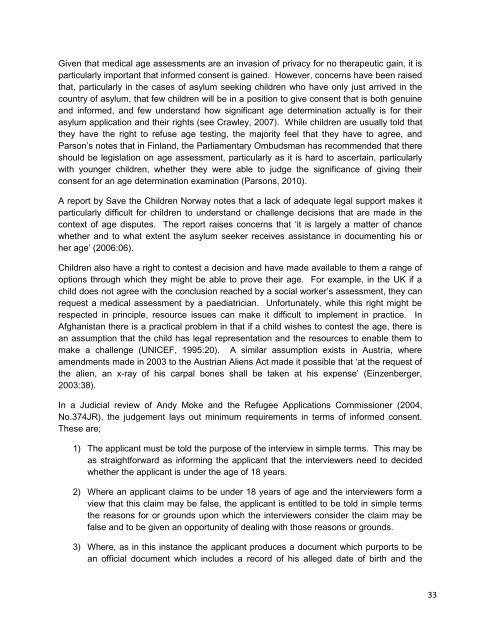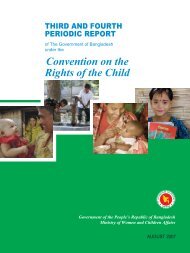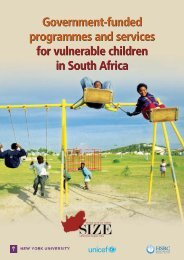Age assessment practices: a literature review & annotated ... - Unicef
Age assessment practices: a literature review & annotated ... - Unicef
Age assessment practices: a literature review & annotated ... - Unicef
Create successful ePaper yourself
Turn your PDF publications into a flip-book with our unique Google optimized e-Paper software.
Given that medical age <strong>assessment</strong>s are an invasion of privacy for no therapeutic gain, it is<br />
particularly important that informed consent is gained. However, concerns have been raised<br />
that, particularly in the cases of asylum seeking children who have only just arrived in the<br />
country of asylum, that few children will be in a position to give consent that is both genuine<br />
and informed, and few understand how significant age determination actually is for their<br />
asylum application and their rights (see Crawley, 2007). While children are usually told that<br />
they have the right to refuse age testing, the majority feel that they have to agree, and<br />
Parson‟s notes that in Finland, the Parliamentary Ombudsman has recommended that there<br />
should be legislation on age <strong>assessment</strong>, particularly as it is hard to ascertain, particularly<br />
with younger children, whether they were able to judge the significance of giving their<br />
consent for an age determination examination (Parsons, 2010).<br />
A report by Save the Children Norway notes that a lack of adequate legal support makes it<br />
particularly difficult for children to understand or challenge decisions that are made in the<br />
context of age disputes. The report raises concerns that „it is largely a matter of chance<br />
whether and to what extent the asylum seeker receives assistance in documenting his or<br />
her age‟ (2006:06).<br />
Children also have a right to contest a decision and have made available to them a range of<br />
options through which they might be able to prove their age. For example, in the UK if a<br />
child does not agree with the conclusion reached by a social worker‟s <strong>assessment</strong>, they can<br />
request a medical <strong>assessment</strong> by a paediatrician. Unfortunately, while this right might be<br />
respected in principle, resource issues can make it difficult to implement in practice. In<br />
Afghanistan there is a practical problem in that if a child wishes to contest the age, there is<br />
an assumption that the child has legal representation and the resources to enable them to<br />
make a challenge (UNICEF, 1995:20). A similar assumption exists in Austria, where<br />
amendments made in 2003 to the Austrian Aliens Act made it possible that „at the request of<br />
the alien, an x-ray of his carpal bones shall be taken at his expense‟ (Einzenberger,<br />
2003:38).<br />
In a Judicial <strong>review</strong> of Andy Moke and the Refugee Applications Commissioner (2004,<br />
No.374JR), the judgement lays out minimum requirements in terms of informed consent.<br />
These are;<br />
1) The applicant must be told the purpose of the interview in simple terms. This may be<br />
as straightforward as informing the applicant that the interviewers need to decided<br />
whether the applicant is under the age of 18 years.<br />
2) Where an applicant claims to be under 18 years of age and the interviewers form a<br />
view that this claim may be false, the applicant is entitled to be told in simple terms<br />
the reasons for or grounds upon which the interviewers consider the claim may be<br />
false and to be given an opportunity of dealing with those reasons or grounds.<br />
3) Where, as in this instance the applicant produces a document which purports to be<br />
an official document which includes a record of his alleged date of birth and the<br />
33
















